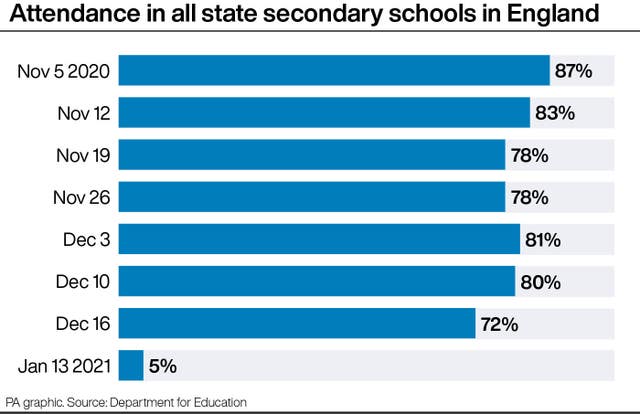Government may take regional approach when reopening schools, medical chief says
The deputy chief medical officer told MPs that ‘some glimmers of hope’ are becoming apparent in London.

England’s deputy chief medical officer Dr Jenny Harries has suggested that a regional approach may be taken when deciding how schools reopen.
When asked whether there could be a regional or phased system for reopening schools, Dr Harries said: “I think it’s likely that we will have some sort of regional separation of interventions.”
The deputy chief medical officer told MPs that we are starting to see “some glimmers of hope” in London, which was one of the areas first affected by the new variant.
Addressing the Commons’ Education Select Committee, she said: “So I think on the broad epidemiology it is highly likely that when we come out of this national lockdown we will not have consistent patterns of infection in our communities across the country.
“And therefore, as we had prior to the national lockdown, it may well be possible that we need to have some differential application.”
But Dr Harries said schools would be top priority to ensure that the balance of education and wellbeing was “right at the forefront” of consideration.
Addressing the committee on the risk of transmission in schools, Dr Harries said: “Schoolchildren definitely can transmit infection in schools – they can transmit it in any environment – but it is not a significant driver as yet, as far as we can see, of large-scale community infections.”
Pupils in schools and colleges – except children of key workers and vulnerable pupils – have been told to learn remotely until mid-February amid the lockdown.
The latest figures show that more than one in five primary school pupils in England were taught on-site last week – which is higher than the number who came to class during the first lockdown.
When asked whether schools will reopen after half-term, Dr Harries said: “It is a Department for Education policy date, but it seems a perfectly reasonable assumption in the sense of if you’re looking at the epidemiology you’re watching a wave of virus come across the country.
“We can see it’s hopefully starting to level off now in the original areas where the new variant rose and we have a national lockdown and we can start to see that those numbers are starting to be contained.
“So you can get a sense of the timeframe in which those waves might come down and we could potentially open schools.

“What I can’t guarantee – that is, in this interval between now and February – (is) that there wouldn’t be another variant, or we may find some other epidemiological change.
“So I think these are very sensible time estimates but they need to be understood as not fixed dates and that would apply to anything in any department in relation to the pandemic.”
Professor Russell Viner, president of the Royal College of Paediatrics and Child Health, told MPs that children have experienced “considerable mental health harms” during the pandemic.
He added that anecdotally, paediatricians and child and adolescent psychiatrists are saying there is “more pressure on eating disorder services” amid Covid-19.
Prof Viner said: “The most important thing we can do for our children and young people’s mental health is to get schools open again and get face-to-face learning and peer interaction happening.”
Following the committee on the science behind school closures, Downing Street said Boris Johnson wanted schools to open “as soon as possible”.
The Prime Minister’s official spokesman said Mr Johnson has previously stated “the priority is to get schools open as soon as possible, but whether that is after the half-term break depends on a number of things”, including progress in the vaccination programme and the possibility of a new coronavirus variant emerging which resists the jab.
Asked whether regional disparities in vaccination rates could slow the reopening of schools in some areas, the spokesman said: “We will continue to look at the latest scientific evidence and data.”





